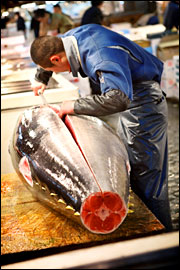The following is a guest essay from Carl Safina, the oceans’ most articulate defender and director of the Orion Grassroots Network member group Blue Ocean Institute. His books include Song for the Blue Ocean, Eye of the Albatross, and Voyage of the Turtle. His blog also is a must-read.

—–
The story goes like this: It’s one of the largest, fastest, most gorgeous fish in the sea. Unfortunately, its extraordinary warm-bloodedness makes its muscle delicious to the strange seafood-loving creatures that live on land. The value of bluefin tuna meat goes up due to global demand for sushi and sashimi. As the price goes up, fishing increases. Too many fish are caught and the population collapses. Over the past 50 years, bluefin fisheries have collapsed off Brazil, in the North Sea, and recently off the eastern U.S. and Canada.
The Commission tasked with managing Atlantic bluefin fisheries is completely broken. The 43-nation International Commission for the Conservation of Atlantic Tunas met this month in, appropriately enough, Turkey, to discuss the fate of bluefin tuna in the Atlantic. Usually referred to by its acronym ICCAT — pronounced eye-cat — it should be called instead ICCAN’T. Or, keep the acronym and change its name to International Conspiracy to Catch All Tuna.
The same can be said for the fishers themselves, who, when it comes to bluefin tuna are represented by ideologues incapable of understanding that collapse is bad for business. They lobby the Commissioners very hard, and on the other end Japan, the main market for bluefin, does everything possible to keep quotas high and the science be damned. So the Commission itself is an odd cross between a fishermen’s pit-bull and Japanese lap-dog. Last year, U.S. fishermen caught only 10 percent of their quota. By any measure, they’re going out of business. Because they consistently refused to discuss cutting their quota for the sake of conservation and their own future, their greed is bankrupting them.
What have they and the commissioners learned from the collapses? Apparently, nothing at all. In fact, in their 40-year history, they have never once managed a fish population sustainably or allowed a recovery. All the fish species under their "authority" are at historic lows, with one exception: the North Atlantic Swordfish. But it took a chef’s boycott and a successful lawsuit to arrest and turn around that fish’s plummet.
The largest remaining Atlantic bluefin population — which breeds in the Mediterranean — is now also endangered with collapse. The quota for fishing in the east half of the Atlantic and in the Mediterranean is more than double what the Commission’s own scientists recommend. Moreover, recent catches have exceeded the limit by more than 50 percent. Actual catches are about 230 percent higher than scientists recommend, meaning that for every one fish that can be sustainably caught, fishermen are killing more than three. The population has halved since the 1970s, with most of the decline occurring in the last five to six years. It’s the familiar bluefin story: Illegal fishing is rampant, too many fish are being caught, and the population is headed for collapse.
At the recent Commission meeting, the United States and Canada proposed a three-year moratorium on bluefin fishing for eastern Atlantic fishing countries — i.e., exempting themselves — to allow member nations time to control illegal fishing and incorporate scientific recommendations. The proposal was quickly rejected. Despite obvious overfishing and decline, Commission delegates actually raised the quota slightly.
Nothing meaningful — at least nothing good — is ever done for bluefin tuna by ICCAN’T. Never mind that the Commission’s own scientists have found that reducing catches and rebuilding the population could lead to substantially higher quotas in as few as 10 years.
Archaeological evidence shows that people have been fishing bluefin tuna in the Mediterranean for at least 9,000 years. A three-year break is not too much to ask to ensure that bluefin are around for the next 9,000.



